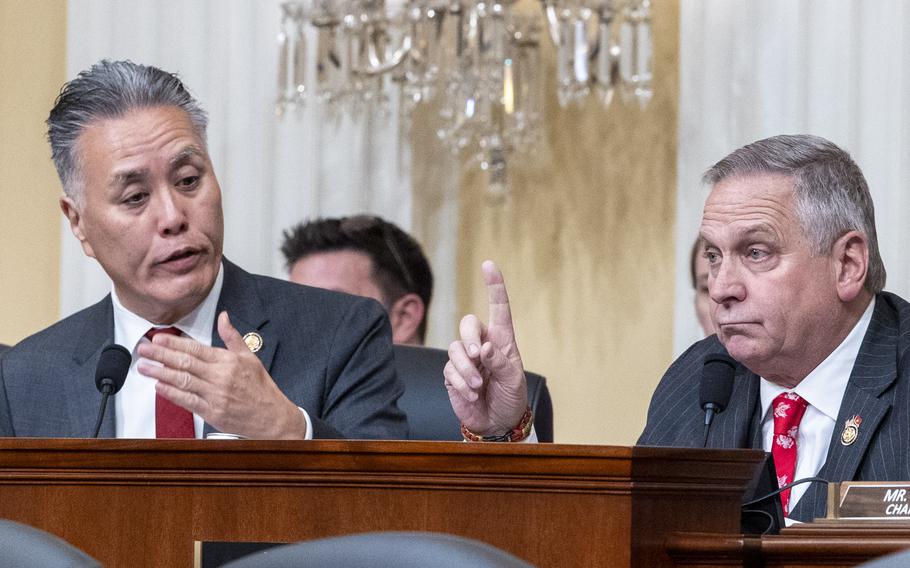
Rep. Mark Takano, D-Calif., left, and Rep. Mike Bost, R-Ill., during a heated discussion at a congressional hearing on Feb. 26, 2025. (Eric Kayne/Stars and Stripes)
WASHINGTON — Rep. Mike Bost, R-Ill., chairman of the House Veterans’ Affairs Committee, is asking Attorney General Pam Bondi to investigate whether former Department of Veterans Affairs Secretary Denis McDonough and other agency leaders violated federal law when they made an urgent request for $3 billion to close a budget shortfall that did not exist.
In an April 29 letter to Bondi, the congressman accused former VA leaders of submitting “materially inaccurate” budget figures and delaying the disclosure of corrected information until lawmakers had appropriated $3 billion in emergency funds for fiscal 2024.
VA leaders also asked for another $12 billion to cover an anticipated shortfall for fiscal 2025 but later reduced the projection by nearly half.
Bost said the House Veterans’ Affairs Committee is seeking to learn whether actions by McDonough, Shereef Elnahal, the former VA undersecretary for health, and Joshua Jacobs, the former undersecretary for benefits, violated federal law, including the submission of false statements to Congress, obstruction of oversight, fraud or misappropriation of federal funds.
Bost said he asked the Justice Department to review VA finances over concerns about a “pattern of troubling actions” by its former leaders that persisted as they formulated, justified and communicated “fake” budget shortfalls.
“If any civil or criminal violations occurred, those responsible must be held accountable,” he wrote.
But Rep. Mark Takano of California, the top Democrat on the House committee, dismissed the request as a political stunt.
“Secretary McDonough and his team led VA through one of its most successful eras in history. I am appalled by his recommendation and blatant weaponization of the judicial system,” he said.
Takano said veterans “deserve better than sham investigations and political theater becoming the new normal.”
Bost referred in his letter to two reports by the VA Office of Inspector General published last month that examined the reasons for the miscalculations in VA requests for an additional $3 billion in fiscal 2024 and another $12 billion for 2025.
The VA is the federal government’s second-largest department with a $469 billion annual budget.
Bost wrote the inspector general’s findings raised significant concerns about whether VA leaders “knowingly withheld material budget information, submitted inflated funding requests, provided false testimony to Congress or otherwise acted to obstruct congressional oversight.”
When McDonough asked Congress for the $3 billion emergency appropriation in July 2024, he warned veterans were at risk of not receiving their regular monthly benefits on time without the injection of funds.
Bost said this week that when he questioned how the VA had arrived at the figures, “officials doubled down in testimony” that the extra dollars were needed to deliver veterans their benefits.
Jacobs told lawmakers at a hearing in September 2024 that the VA had validated its forecast before disclosing the information to Congress.
McDonough attributed the need for the emergency supplemental funding request for fiscal 2024 to more veterans receiving VA compensation, according to the IG report.
Congress passed a supplemental appropriations bill that former President Joe Biden signed into law Sept. 20, 2024, to cover VA disability compensation, pensions and other benefits for more than 7 million veterans through Sept. 30, the end of the fiscal year.
But by November, VA leaders informed lawmakers there was no shortfall in 2024. The VA actually closed the fiscal year with a surplus of $5.1 billion, according to the agency.
For fiscal 2025, which runs from Sept. 30, 2024, to Oct. 1, 2025, higher costs for an increase in health care enrollments, payroll and equipment purchases have fallen within original budget estimates, the VA said.
The $12 billion budget gap that VA leaders projected was expected to be closer to $6.5 billion, the VA later reported.
The Veterans Benefits Administration’s Office of Financial Management “knew after the law’s enactment on Sept. 20 they did not need the funding for the compensation and pension account,” according to the inspector general’s findings.
But VBA officials did not communicate to Congress until more than a month later that the compensation and pension funding was not needed to pay veterans their benefits, according to the findings.
The inspector general found improved financial management practices would have reduced the risks of inaccurate projections.
From March through September 2024, the Veterans Benefits Administration “continued to emphasize the risk to veterans in its communications to Congress, even though the data increasingly suggested there might actually be less need for supplemental funding as time went on,” the report stated.